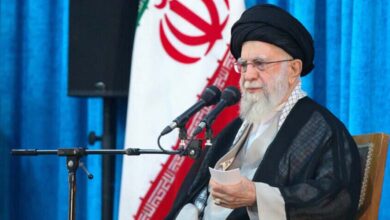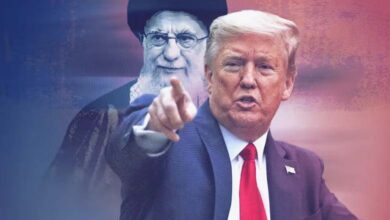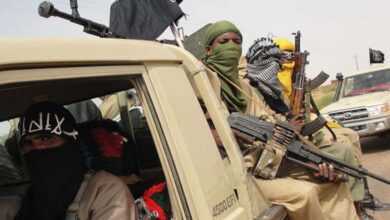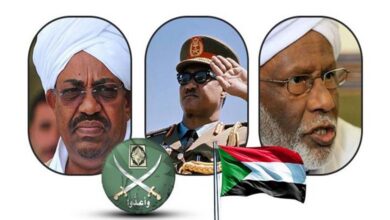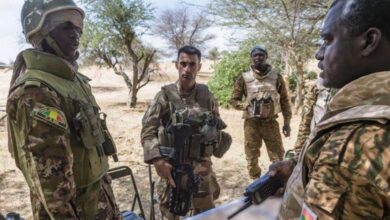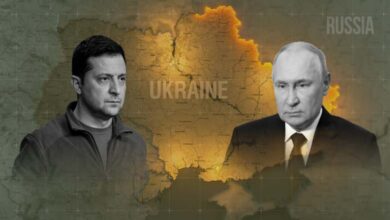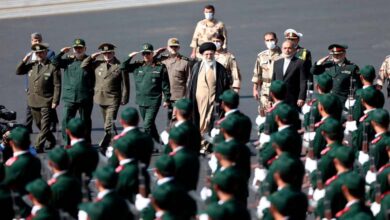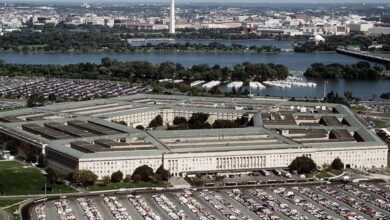Trump and Netanyahu Announce Gaza Peace Plan Amid Uncertainty Over Hamas’ Response
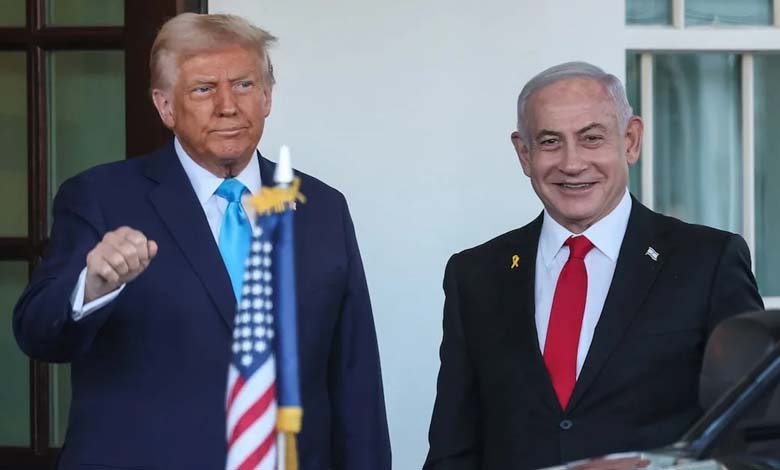
Eight Arab and Muslim countries, along with the Palestinian Authority, endorse Trump’s peace initiative.
U.S. President Donald Trump secured on Monday the approval of Israeli Prime Minister Benjamin Netanyahu for a U.S.-brokered peace proposal for Gaza, aimed at ending nearly two years of conflict in the Palestinian enclave. Questions, however, remain over whether the Palestinian movement Hamas will accept the initiative.
-
Smotrich Preempts Trump-Netanyahu Meeting with Six Red Lines on Gaza Plan
-
Displaced in a cemetery: Gaza’s living seek refuge among the dead
Speaking at a joint press conference at the White House alongside Netanyahu, Trump said they were “very close” to a peace agreement and expressed hope that Hamas would also accept the proposal. But he warned that if Hamas rejected the deal, Israel would enjoy Washington’s full support to take any measures it deemed necessary.
During their meeting, the White House unveiled Trump’s 20-point plan. The framework calls for a ceasefire, the exchange of hostages held by Hamas for Palestinian prisoners in Israeli jails, a gradual Israeli withdrawal from Gaza, the disarmament of Hamas, and the establishment of a transitional government under international supervision.
-
Refusal to Apologize for the Cost of War: Senior Hamas Official Distances Himself from Gaza Civilians’ Suffering
-
What Does Trump’s New Plan to End the Gaza War Include?
Trump entered the talks seeking to ease Netanyahu’s doubts about certain aspects of the plan. It remains unclear whether all differences between Washington and Israel have been resolved, particularly regarding the possibility of a future Palestinian state – strongly opposed by Netanyahu – and the potential role of the Palestinian Authority in governing Gaza after the war.
“I also want to thank Prime Minister Netanyahu for approving the plan and for his confidence that, if we work together, we can put an end to the death and destruction we have witnessed for years, decades, even centuries, and open a new chapter of security, peace, and prosperity for the entire region,” Trump said.
Standing beside him, Netanyahu responded: “I support your plan to end the war in Gaza, which achieves our strategic goals. This plan will bring all our hostages back to Israel, dismantle Hamas’ military capabilities, end its political rule, and ensure that Gaza never again poses a threat to Israel.”
-
Day of Triple Recognition: Palestine Born from Gaza’s Suffering
-
Behind Every Number, a Tragedy… 11 Displacements into the Unknown Amid Gaza’s Ruins
Yet Hamas remains the key to the plan’s success. Its absence from negotiations and its repeated refusal to disarm cast doubt on whether the initiative can succeed.
Israel claims that Hamas, which launched the war with its October 7, 2023 attack, still holds 48 hostages, 20 of whom are believed to be alive. A Hamas official said the group had not yet received the plan officially and knew no more than what was reported in the media. Later, however, a source close to the talks confirmed that Qatar and Egypt had shared the document with Hamas, which indicated to mediators that it would review it “in good faith” before responding.
-
From Death to Death: Stories of Escape from the Hell of Gaza
-
Conflicting reports on an Israeli ground incursion in Gaza as nearly half the city’s residents flee
Meanwhile, Ziad al-Nakhalah, the Secretary-General of Palestinian Islamic Jihad, dismissed the announcement as a “recipe for igniting the region.” The group, an ally of Hamas backed by Iran and also holding hostages, said in a statement that what was announced was merely a “U.S.-Israeli agreement fully reflecting Israel’s position and serving to extend aggression against the Palestinian people.” It accused Washington and Tel Aviv of attempting to impose diplomatically what they had failed to achieve militarily.
This marked Netanyahu’s fourth visit to the White House since Trump returned to office in January. Facing a wave of official recognitions of a Palestinian state by Western nations, Netanyahu sought to bolster Israel’s ties with its most crucial ally. Trump, who condemned those recognitions as a “gift to Hamas,” was keen to secure Netanyahu’s backing despite lingering Israeli doubts about elements of the plan.
-
Israeli leaders in the UN spotlight: accused of genocide in Gaza
-
Palestinian political analyst: despite their importance, aid convoys are not enough to meet Gaza’s needs
Washington simultaneously presented the proposal to Arab and Muslim countries on the sidelines of the UN General Assembly the previous week.
Eight nations – Turkey, Jordan, the United Arab Emirates, Indonesia, Pakistan, Saudi Arabia, Qatar, and Egypt – issued a joint statement welcoming Trump’s “sincere efforts.” They pledged to cooperate positively and constructively with the United States and other stakeholders to finalize and implement the deal, ensuring peace, security, and stability for the region’s peoples.
The Palestinian Authority also welcomed the initiative, reaffirming its commitment to working with Washington and its partners toward a comprehensive agreement.
-
Latest News from Gaza: Towers Collapse as Ground Operation Imminent
-
Gaza War: Britain Punishes Israel in an Unexpected Way
The joint statement emphasized that the agreement must guarantee uninterrupted humanitarian aid to Gaza, prevent forced displacement of Palestinians, secure the release of hostages, establish a security mechanism to safeguard all parties, ensure Israel’s full withdrawal from Gaza, and launch reconstruction efforts. It also called for a fair peace process based on the two-state solution, ensuring Gaza’s integration with the West Bank in line with international law.
Netanyahu, however, faces mounting pressure, both from hostage families and from an Israeli public weary of war, according to opinion polls. He also risks the collapse of his governing coalition if far-right ministers perceive the concessions as excessive.
-
Israel expands its operations in Gaza: deaths, evacuation orders, and relentless bombardment
-
The Night of the New York Declaration in Gaza: Heavy Bombardments and Dismembered Bodies
The war, triggered by Hamas’ October 7 attack, killed 1,200 people in Israel and led to the abduction of 251 hostages. Gaza health authorities say Israel’s military campaign has killed 66,000 Palestinians and created a severe humanitarian crisis.
The U.S. plan, drafted by special envoy Steven Witkoff and former Trump advisor Jared Kushner, calls for a ceasefire followed within 72 hours by the release of all remaining hostages in exchange for hundreds of Palestinian prisoners, along with a gradual Israeli troop withdrawal from Gaza.
It sketches a vague path toward a Palestinian state, contingent on Gaza’s reconstruction and reforms within the Palestinian Authority, though details remain scarce. The question of a future Palestinian state – something Netanyahu has vowed never to allow – remains one of the central sticking points.
-
Quarter of a million displaced from Gaza City as Israel vows to defeat Hamas
-
The bitter memory of displacement keeps them from fleeing south… Painful stories from the heart of Gaza
The plan also envisions the creation of a temporary stabilization force, comprising Arab partners and international actors, tasked with overseeing security in Gaza.
Under the arrangement, Gaza would be governed without Hamas’ participation, with only limited involvement of Palestinian Authority representatives at first. According to the White House, day-to-day affairs would be managed by a Palestinian technocratic committee, overseen by an international “Peace Council” chaired by Trump and including former UK Prime Minister Tony Blair.



